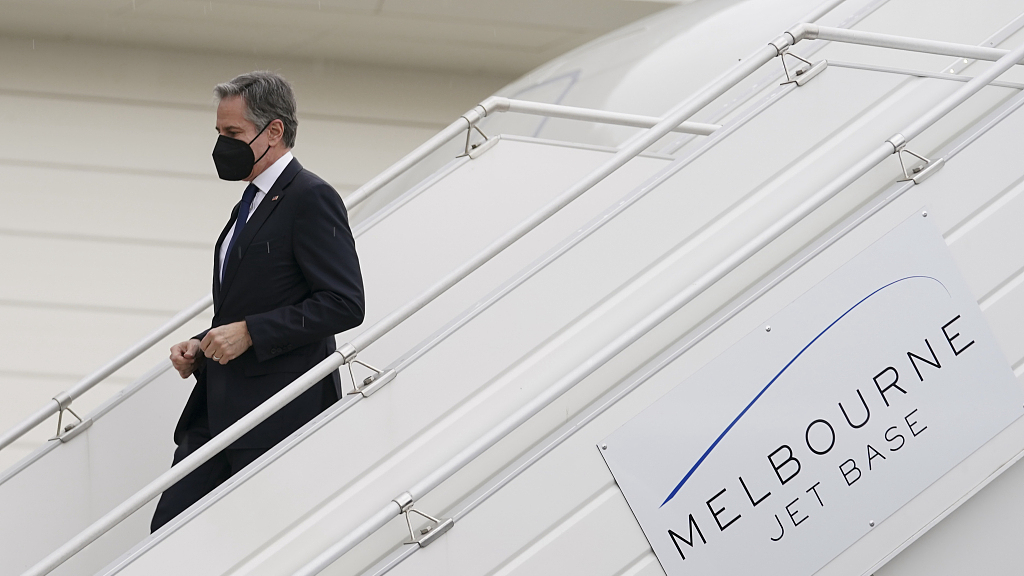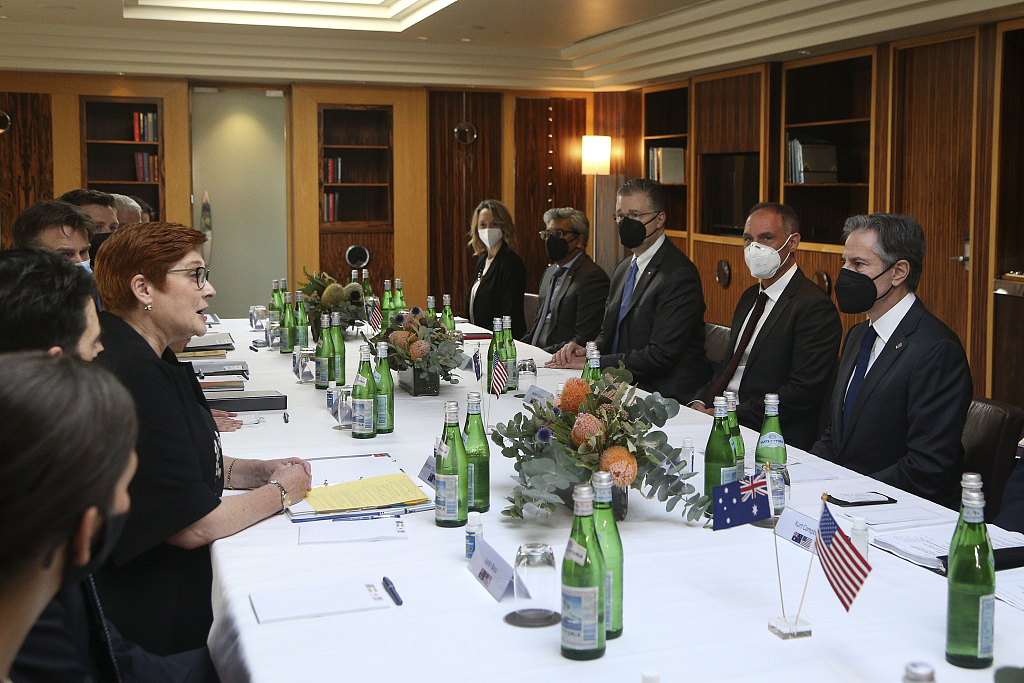
U.S. Secretary of State Antony Blinken steps from his plane on arrival in Melbourne, Australia, February 9, 2022. /CFP
U.S. Secretary of State Antony Blinken steps from his plane on arrival in Melbourne, Australia, February 9, 2022. /CFP
Editor's note: Daryl Guppy is an international financial technical analysis expert. He has provided a weekly Shanghai Index analysis for Chinese mainland's media for more than a decade. Guppy appears regularly on CNBC Asia and is known as "The Chart Man." He is a national board member of the Australia China Business Council. The article reflects the author's opinions and not necessarily those of CGTN.
U.S. Secretary of State Antony Blinken's Australian visit to discuss the Quadrilateral Security Dialogue (Quad) brought little to the table other than to reconfirm that the Quad is unequivocally aimed at thwarting China as a powerful and legitimate force within the region.
With no regard to history and scant regard to reality, Blinken boldly asserted that China's aim was to take over the world. This claim was presented as a self-evident statement of fact that required no evidence to substantiate it.
This is a dangerous style of thinking because it reflects a faith-based approach to understanding the world. His approach is cloaked in the language of liberal democracy and rules-based order, but it covers a deeper view that divides the world into good and evil. Although from a similar background, Blinken is no Henry Kissinger who held a firm grasp of realpolitik and an excellent understanding of China.
A faith-based approach does not require evidence of wrongdoing. It only requires belief that wrongdoing is possible. It is a belief about assumed intent rather than a conclusion based on actual activity. This is a dangerous foundation for foreign policy.
There is no evidence that China wishes to impose its political structure on countries outside of China. The evidence shows that China does not tie its aid assistance to the promotion of Chinese socialism in the recipient country. Aid delivery is based on need.
This infuriates the United States because their aid is usually dependent upon the recipient country agreeing to a range of political objectives promoted by the United States. The exception, of course, is assistance to fiercely anti-democratic countries that are supporting U.S. policy objectives.
Blinken and his Australian colleagues are engaged in a pattern of deception that is akin to trying to make a silk purse out of a pig's ear when it comes to justifying Australia's purchase of nuclear-powered submarines.
Australia is the first non-nuclear-weapons state to develop nuclear-powered submarines, and this challenges Australia's position in relation to the nuclear non-proliferation treaty. Australia has increased its diplomatic efforts to convince the International Atomic Energy Agency that Australia is still compliant with its obligations.

U.S. Secretary of State Antony Blinken (R) sits with Australian Foreign Minister Marise Payne (L) meet in Melbourne, Australia, February 11, 2022. /CFP
U.S. Secretary of State Antony Blinken (R) sits with Australian Foreign Minister Marise Payne (L) meet in Melbourne, Australia, February 11, 2022. /CFP
Ben Zala, senior lecturer in international relations at the Australian National University, noted, "It's going to need creative thinking to work out how we can figure out some new arrangement with IAEA and give other states confidence that we're not undermining the regime too much."
Australia has a history of this type of disingenuous distortion. This type of accounting manipulation formed the basis of the 2017 WTO anti-dumping complaint against Indonesia. The claim was rejected because Australia's calculation of the cost of production was inconsistent with proper practice. Australia's use of distorted figures at the Glasgow Climate Conference was widely condemned. It is no surprise that the same tactics are used to make the purchase of nuclear submarines appear benign.
Perhaps the most interesting observation from the Quad meeting comes from what was not covered rather than what was reported. There was no mention of the application of diplomacy to resolve the points of difference between China and Quad members.
This rejection of diplomacy is a crucial omission. Without diplomacy, without ongoing and informed contact at all levels of Government and business, it is very difficult to develop suitable policy reactions. It's a requirement well understood by Henry Kissinger with his shuttle diplomacy. Instead, policy decisions are based on irrational fears, on understandings informed by propaganda and distortions rather than reality, and on appeals to the most xenophobic fears in a domestic electorate.
Some Australian politicians and media enthusiastically embraced these belligerent approaches, with Defense Minister Peter Dutton going so far as to claim that the Chinese government wanted Labor to win the federal election. The two sides of Australian politics have a Tweedle-Dum, Tweedle-Dee approach to China. The only real difference is that one side believes that diplomacy has a part to play in the management of the Australia-China relationship.
Historically, Australia was positioned as an outpost of the European world sitting uncomfortably close to Asia. It wasn't until the government of former Prime Minister Gough Whitlam established diplomatic relations with China in 1972, and later under the leadership of Paul Keating, that Australia began to engage with China and the region as partners. Forty-five years later, this momentum is under sustained attack, with Australia egging on its Western partners to come to Australia's protection.
Australia has a long history of being involved in wars in foreign lands in the hope that this will create a sense of obligation towards Australia amongst its allies. The Quad treaty is the most recent example of this desire to create a situation where the partners feel some obligation towards Australia. This is an Australian article of faith that ignores reality and the role diplomacy can play.
(If you want to contribute and have specific expertise, please contact us at opinions@cgtn.com.)

